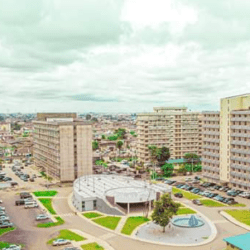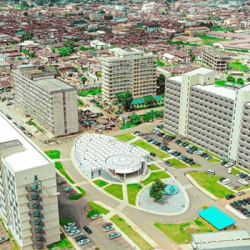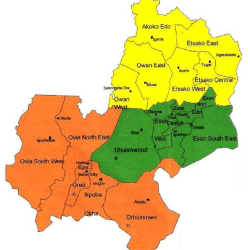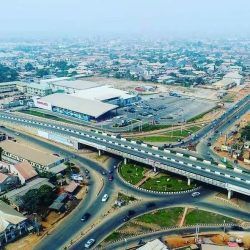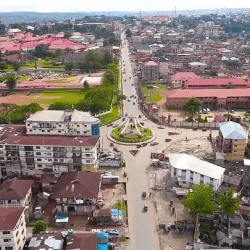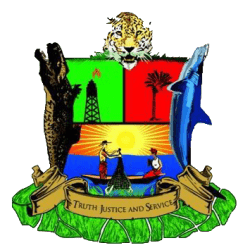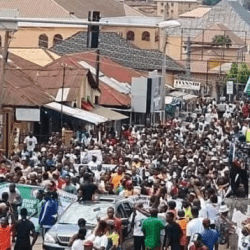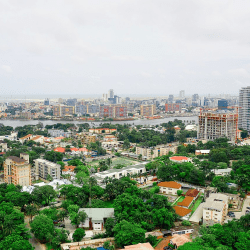Edo State House of Assembly, one of the 36 State Houses of Assembly in Nigeria, came to being as a result of the creation of Edo State out of the then Bendel State.



The Edo State House of Assembly has had a checkered history spanning over a decade. After contending with the problem of colonialism and neo-colonialism, the other problem Nigeria had to face and is still facing is political instability. Since Nigeria gained political independence from Britain in 1960, she had witnessed incessant military intervention in politics. Out of the 46 years of Nigeria’s political independence, the military has ruled for up to 33 years and this has not been healthy for the sustenance of democratic government in Nigeria.
Whenever the military had the cause to seize power, their first action is to suspend the constitution thereby rendering all democratic institutions prostrate. The greatest casualty had always been the legislature with its entire pivotal role in democratic governance. In the comity of nations, the legislature in Nigeria remains a toddler. The Executive and Judiciary as arms of government have always had their structure to maintain while the legislature was always sent packing anytime the military struck. The legislature is indeed the ‘weeping boy’ of any military interregnum.
Looking at both the British and American legislature, Kenneth Bradshaw and David Ring (1981) had this to say; “Parliament since the Restoration and Congress since it’s beginning have an uninterrupted history of protecting the freedoms of the people and of giving expressions to their will’’ contrary to what obtains in Nigeria
The yoke of the colonial rule was finally taken off the neck of Nigeria in 1960 October 1st and became a Republic on the 19th September 1963. Parliamentary elections were held in the four regions of the country in 1964. They are Northern, Eastern, Western and Mid-Western region.
The legislature then was bi-camera. In other words, the legislature at both the Federal and Regional levels was made up of two chambers namely the Upper House and the lower house. At the Federal level it was made up of the Senate and the House of Representatives while at the Regional level, the legislature was made of the House of Assembly and the House of Chiefs. The House of Assembly was made up of elected members from different political parties while the House of Chiefs was mainly made of First class traditional rulers. With regards to House of Chiefs, it was made up of number of traditional rulers with the Oba of Benin, Oba Akenzua II as its President. In the House of Assembly, parliamentary elections were held on Monday February 3, 1964, and 3 political parties, the National Convention of Nigerian Citizens (N.C.N.C), the Mid-west Democratic Front (M.D.F) and Actions Group (AG) contested the available 65 seats. Out of the 65 members elected, N.C.N.C. had 55, M.D.F.9, and A.G got 1 respectively.
At the inauguration of the Mid-west House of Assembly on March 9, 1964, Hon. P.K. Tabiowo was elected as the Speaker of the House, Hon.C.A.J.Nwajei Deputy Speaker, Hon. (Dr.) Christopher Gbelokoto Okojie as Leader of the House, while Hon.A.Opia was elected as the chief whip.
In 1966, the First Republic came to an abrupt end when the military struck and took over political power in a coup d’ etat led by Lt. Col. Kaduna Nzeogwu.
The four- region geo-political structure of Nigeria was changed as a result of state creations in 1967 during the military regime of Col. Yakubu Gowon. Though no new state was created out of the defunct Mid-west region, its name was changed to Bendel state reflecting the Benin and Delta provinces that made up the former Mid-west region.
In 1979, the Second Republic was born. Nigeria returned to democratic rule and elections were held through out the country under the Presidential System of government that was supervised by the military under the leadership of Gen. Olusegun Obasanjo.
In the Second Republic, three political parties sponsored their members during the elections into Bendel state House of Assembly.The political parties were, the Unity Party of Nigeria (U.P.N), National Party of Nigeria (N.P.N) and Nigeria Peoples Party (N.P.P). A total of 60 members were elected. U.P.N. had 34 seats, N.P.N. 22, and N.P.P with 4 seats.
At its inaugural sessions in October 1979, Hon. Benson Anthony Alegbe emerged as the Speaker of the House, Hon. Francis Spanner Okpozo, Deputy Speaker, Hon. Joshua Osa Aiwerioghene, Majority leader, and Hon. John A. Odeh Chief Whip.
The first Assembly of the Second Republic came to an end in 1983 after the four years tenure as required by the constitution. Elections were held in August 1983 in order that the second Assembly of Second Republic could take off, 60 members were again elected into the Bendel State House of Assembly under their respective parties. The N.P.N won 53 seats, U.P.N. 6 seats while N.P.P had I seat.
The Second Assembly of the Second Republic was inaugurated in October 1983, and Chief Hon. Louis Ijeoma of blessed memory was elected the Speaker, Hon. J.O. Sajere was made the chief whip, Hon. J.O Aghimien, Majority leader, Chief Hon. P.A. Aigbavboile as minority leader.
The life span of the Second Assembly of the Second Republic was indeed short as it was sent packing three months after it was inaugurated (October-December 1983) by the Military in a coup led by Maj.Gen.Muhammadu Buhari. This brought to an end, the Second Republic.
Nigeria and Nigerians still in search of democratic rule in 1991 under the leadership of Gen I.B Babangida who overthrew Gen Buhari in 1985 organized general elections and 28 members were elected into the Edo State House of Assembly on 14, December 1991. The fact that 2 states namely; Edo and Delta were carved out of the defunct Bendel state explains the change in the name.
The members were elected under two-party arrangement. The parties were; The Social Democratic Party (S.D.P) and the National Republican Convention (N.R.C). The S.D.P. won 17 seats while the N.R.C had 11 seats. The Third Republic took off in earnest when the 28 members of the Edo State House of Assembly were sworn in on the 16th of January 1992. At the swearing in ceremony, Hon Matthew Eimiosio Egbadon was elected the speaker of the House, Hon.K.E Jegede; Deputy Speaker, Hon F.N.E Oviawe; Majority Leader; Hon B.A Itua; Minority Leader, Hon A.A. Abu; Chief Whip and Hon A.L Momodu became the minority Whip.
There was however a change of leadership in the House as Hon Joe Iruafemi Ekpenkhio replaced Hon.Matthew E. Egbadon as Speaker on August 13, 1993; Hon O.A. Osadolor became the Deputy Speaker while Hon. D.E Aimiebenomon was made the Majority Leader.
There was yet another military take over of power and Nigeria’s dream of having sustainable democratic rule was scuttled in 1993. This could best be described as a “Palace Coup” in which late Gen Sani Abacha sacked the Interim Government of Chief Ernest Shonekan that came into being when Gen I.B. Babangida “stepped aside” in August 1993. This saw the end of the 3rd Republic.
As Nigeria and Nigerians indeed believed that the worst civilian rule is better then the best military regime, the military government under the leadership of General Abdulsalam Abubakar who assumed leadership after the demise of Gen.Sani Abacha resolved to return the country to a democratic rule in 1999.
As part of the journey to Nigeria 4th Republic, elections were held throughout the country in 1999.In Edo state, 24 members were elected to the House under the platform of new political parties. These political parties are the Peoples Democratic Party (PDP) and the All Nigeria Peoples Party (ANPP) that were the only viable political parties in Edo State. Out of the 24 members, 22 were elected under the ticket of P.D.P.while 2 seats went to A.N.P.P.
At the inauguration of the House on October 1st, 1999, Hon. Thomas Ebosele Okosun was elected as the Speaker of the House, while Hon. Pally Obokhuimen Iriase became the Deputy Speaker; Hon.Matthew Iduoriyekemwen became the Majority Leader, Paschal Ikpemoghena Ugbomen became the Chief Whip.
Change, they say is the only thing that is permanent in life and this maxim seems to be manifesting in the House as there was yet another change. Some principal officers were replaced. The change saw Hon. Matthew Eimiosio taking over from Hon. Thomas Ebosele Okosun as the Speaker in February 2000. This marked the second coming of Hon Matthew E. Egbadon as the Speaker. Also affected was the office of the Chief Whip as Hon. Lukman Muhammed replaced Hon. Paschal I.Ugbome as the new Chief Whip.
At the expiration of the term of the first Assembly in the 4th Republic election as usual took place in the year 2003. On 1st October 2003, 24 members, all of the P.D.P. were sworn in. Equally sworn in was Hon. Friday Obomezele Itulah as the Speaker of the House of the Second Assembly of the 4th Republic. Hon. Omon Ezomon became the Deputy Speaker; Hon Patrick Obahiagbon emerged as the House leader while Hon. Imodagbe Shaibu A was made the chief whip. On the 15th October 2003, barely 4 months into the second Assembly there was again a change that made Hon. David Ifekekhian Iyoha the new Speaker.
After more than 2years, the lawmakers saw the need to replace both the Speaker and Leader of the House. This time, the mantle of leadership fell on the Hon. Friday Obommezele Itulah, and this marked his second occupation of the exalted position of the Speaker of the House on January 15th, 2006 while Hon. Elizabeth Ighodaro became the Leader of the House.
The House still desirous of a change, effected a minor ‘cabinet reshuffle’ on 26th August 2006 which saw the emergence of Hon. Omoigberai Fred as the new Deputy Speaker, Hon. Agbabi Anslem as the new Chief Whip and Hon. Obahiagbon Patrick as the new House Leader a position he held before the last change in the leadership of the House.
The third session of the Edo State House of Assembly was duly inaugurated on the 5th of June 2007. The election which preceded the inauguration saw the emergence of Rt. Hon. Zakawanu Garuba a two time member representing Etsako-West 1 constituency as Speaker of the House. The other elected principal officers wereHon. Aigboun .O. Levis as Deputy Speaker Representing Ovia North East 1 Constituency, Hon. Frank Okiye as Majority Leader Representing Esan North East 1 Constituency , Hon. Paul Ohonbamu as Minority Leaderas Representing Egor Constituency, Hon. (Mrs) Elizabeth Ativie as Chief Whip Reprsenting Uhumwode Constituency, Hon Shaibu Philip as Minority Whip Representing Etsako West 2 Constituency and Hon. Ehigiamusor O. Kingsley as Co-Opted Member of the POC. Representing Igueben Constituency
The unique feature about the House is the increment in the number of members of the opposition party. While the People’s Democratic Party (PDP) has only 16, the Action Congress (AC) a relatively new Party have a number of 8 members
Reference: edostatehouseofassembly.org/
Edo
Edo is a state in southern Nigeria that was created in 1991 from the former Bendel State
The capital and largest city of Edo State is Benin City, which was the center of the ancient Benin Empire

The state has a population of about 4.8 million people as of 2022, and covers an area of 19,559 square kilometers

Edo state is bordered by Kogi, Anambra, Delta and Ondo states, and has a coastline on the Atlantic Ocean
The state is home to various ethnic groups, mainly the Edo (or Bini), Esan, Ora, Akoko-Edo, Owan and Afemai people
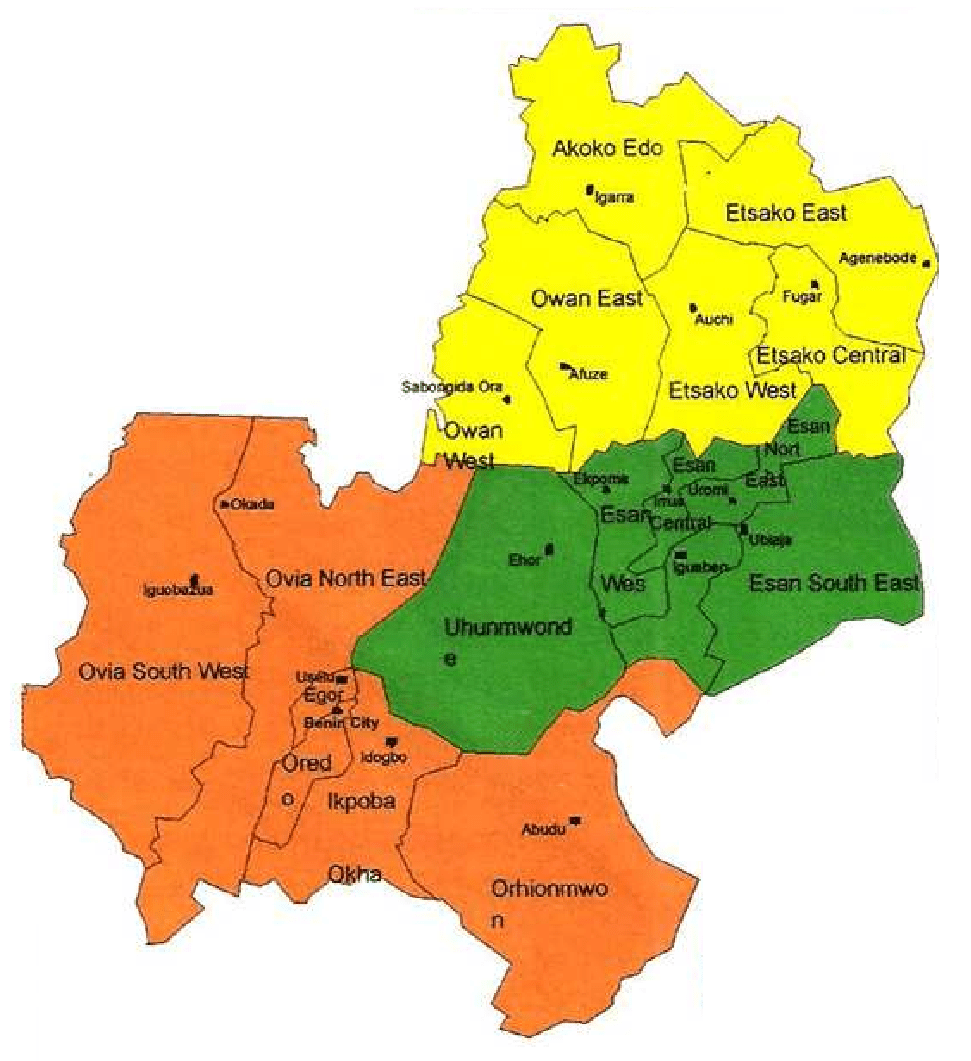
The most common language spoken in the state is Edo, which belongs to the Edoid branch of the Niger-Congo language family
The state is predominantly Christian, but also has followers of Islam and traditional religions
Edo is known as the Heartbeat of Nigeria, and has a rich cultural heritage and history
It has a diverse economy, with sectors such as agriculture, manufacturing, oil and gas, tourism, education and health


Edo people
With Benin City as capital, the population of the entire state is approximately 4million.It is made up of three major ethnic groups; namely the Binis, Esan and Afemai. However the State has a high presence of residents from across the country and the world because of its cosmopolitan tendencies. Benin City the capital has a history of being one of the foremost destinations of Europeans during their exploration of Africa continent many centuries ago. Some of the flash points have remained enviable tourists’ attraction for the state.


Geography
The State has a land mass of 19,794 km square. Lying on 05 44 N and 07 34 N latitudes,05 4 E and 06 45 E longitudes. Edo State is low lying except towards the north axis where the Northern and Esan plateaus range from 183 metres of the Kukuruku Hills and 672 metres of the Somorika Hills.
Location
It is so located that it forms the nucleus of the Niger Delta region. It is bordered by Kogi state to the North and Delta State to the East and South, Ekiti and Ondo States to the West.
Climate
The climate is typically tropical with two major seasons- the wet (Rainy) and the dry (harmattan) seasons. The wet season lasts from April to November and the Dry Season December to March.
Government
The governor of the state, at every time is the head of government. There is the Executive arm of government, the Legislature and the Judiciary. The state has eighteen local government councils each constitutionally headed by a democratically elected Chairman.
Vegetation
Edo is blessed with two major vegetational belts namely: the Forest Belt of the South and Central parts while the Guinea Savannah is in the northern part.
Minerals
Natural resources in Edo State are in abundance. There is a heavy reserve of hard wood and high quality timber. Other mineral endowments include: Rubber, Limestone, Marble, Lignite, Clay, Kaolin, Crude Oil, Gold, Granite and Bitumen.
Agriculture
Apart from the wood products, there is high yield of Agricultural food crops, Cocoa,
Rubber, Palm trees, Vegetables, Cotton, Pineapple, Mango, Cashew, Cassava, Bushmeat, Snails, Fish and Rice.
Industries
The thriving industries are Carving, Saw-milling, Rubber processing, Cement and Textile, Brewing and Flour milling etc. The state also boast of key industries in the country such as Bendel Cement Factory Okpella, Bendel Brewery Benin City, Guinness Nigeria Benin-City, Nigeria Bottling Company (Coca-Cola) Benin City, Ewu Flour Mill Ewu and Bendel Pharmaceutical Benin-City, Okomu oil Plc , Presco Plc just to name a few. The Small-Scale industries are also on the increase with many Banks and Fast Food Eateries opening up their outlets in the capital and other emerging cities across the state.
Education
Edo State is one of the most educationally advanced States in Nigeria. Its notable tertiary institutions include the University of Benin, Ambrose Alli University Ekpoma, Igbinedion University Okada, Benson Idahosa University, Auchi Polytechnic Auchi, College of Education Ekiadolor, College of Agriculture Iguoriakhi and Institute of Management and Technology Usen.
Healthcare
Government in conjunction with local governments and some international agencies have successfully spread Medicare across the state. There are government hospitals, local government centres by local authorities and quite a few others jointly managed with some non governmental agencies.
Seaports
From Edo State, there is easy access to Warri seaports. The state also has a direct route to Lagos from land and air. Edo is known as the heartbeat of the country because of its easy accessibility from various Southern cities like Lagos, Warri, Port Harcourt and the Eastern states.
Arts and culture
Edo is famous for her works of art, they include plaques, busts and royal figures. Some of these art works were looted during the British invasion of the Benin Empire in 1897. Various pottery, utility carving, bronze casting, smothering, Jewelry, mat-making, cloth weaving etc thrive in the state.
